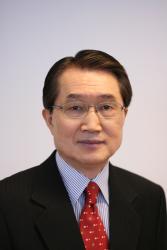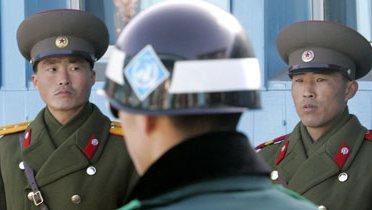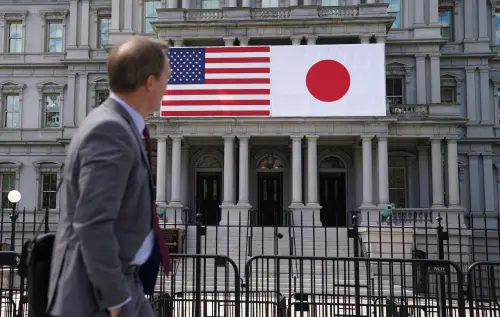The summit between U.S. President Barack Obama and Chinese President Hu Jintao on January 19 was a significant beginning to the year 2011 in the field of international relations, and for the sake of the global economy, environment, and security. The North Korea conundrum was high on the agenda of the summit talks, and whether the two leaders might come to any agreement—given the sharp contrast between the two powers’ respective responses to the slew of dangerous North Korean military provocations in 2010—drew keen attention from both government officials and outside observers.
The disparities over North Korea were so wide that they might have derailed President Hu’s long-planned visit, but the personal intervention of President Obama and a subsequent realistic turn of thinking in China salvaged it. By sinking a South Korean naval vessel in March, undertaking artillery attacks on South Korea’s Yeonpyeong Island in November, and unveiling a uranium enrichment program, North Korea troubled Sino-U.S. relations throughout 2010 and helped bring them to their low point late in the year.
On December 5, when tension after the Yeonpyeong shelling was at its worst, President Obama phoned President Hu and asked China to rein in North Korea to stop its military hostilities against the South. China sent a high level foreign policy official, State Councilor Dai Bingguo, to Pyongyang. Shortly thereafter, North Korea gave only a low-key response to South Korean military drills rather than the violent response it had threatened earlier. It is widely believed that Chinese intervention stopped the North’s brinkmanship and the heightened tension around the Korean peninsula was defused, and an obstacle to the Obama-Hu summit was overcome.
President Obama’s strong personal intervention seems to have been an important factor. Columnist David Ignatius wrote in the Washington Post on December 26, 2010 that in his phone call the president even cautioned his Chinese counterpart that (in Ignatius’s words) “because North Korea is a nuclear nation, its recklessness threatens the United States.”[1] Ignatius argued that the White House thought that the Chinese understood the message and warned North Korea to back down. The case vindicated the theory that once China was determined to reign in North Korea, it could do so.
China
’s leverage over North Korea
During the Cold War era, both China and the former Soviet Union supported their comrade country, North Korea, politically and economically. Kim Il-sung’s shrewd equi-distance strategy induced both big neighbors to support Pyongyang endlessly. Since the end of the Cold War, world-wide political transformation had such an impact on both neighbors that they dramatically reduced their support for Pyongyang. But North Korea muddled through years of economic difficulty, such as the massive devastation from heavy flooding in 1994, a resulting famine, and the subsequent chronic spiral of drought and flooding. North Korea’s survival is owed largely to outside help, from the South Korean sunshine policy and a rising China’s increasing assistance. Then, around the mid-2000s after short-lived market reforms and signs of opening, Pyongyang made a choice: getting tough internally and showing toughness externally. Contrary to global hopes and demands, and imperiling the regime rather than bolstering it, the North conducted its first test of a nuclear device in 2006 and another in 2009.
China agreed to resolutions by the United Nations Security Council sanctioning North Korea for its nuclear tests in 2006 and 2009. China was seen as acting responsibly as a permanent member of the UN Security Council and the international community praised Beijing. China then became increasingly critical of North Korea’s bad behavior. This tougher stance by China ironically increased its influence over North Korea: the two sanctioning resolutions have made North Korea more and more isolated from the rest of the world and, therefore, ever more dependent on China for economic and energy assistance.[2]
China has for a long time argued that it does not have effective leverage to influence North Korea, while the United States and other regional countries assert the opposite. In fact, there is a wealth of data showing that China has provided the North with ample food and energy that has helped sustain it in the midst of its ever deteriorating economy and deepening isolation from the world. Nobody doubts, probably except the Chinese themselves, that China possesses the political and economic ways and means to effectively influence North Korea. The argument that China does not possess leverage is a myth.
Balancing priorities
But China appears extremely reluctant to use this leverage. In 2010, Beijing refused to agree that North Korea bore responsibility for the sinking of the South Korean navy ship Cheonan, refused to publicly criticize it for its artillery attack on South Korea’s Yeonpyeong Island, and refused to condemn it for its development of a uranium enrichment program. Furthermore, it refused to allow UN debate over any of these issues. International pressure failed to influence Beijing.
Numerous press reports, some quoting somewhat imaginative analysis, have put forth some plausible rationales behind the Chinese protection of North Korea. The typical argument is that without Chinese assistance and protection, the Kim Jong-il regime would collapse and the results would be potentially detrimental to Chinese security and economic interests. The instability and potential chaos at China’s doorstep, this argument goes, would more or less harm the peaceful environment necessary for China’s continued economic growth. On the contrary, many pundits argue that those apprehensions come more or less from the imagination or exaggeration. The potential post-Kim chaos, critics say, is in no way comparable to the North’s dangerous military adventurism and its horrendous nuclear weapons program.
Rather, it seems more obvious that China is for the moment playing the North Korea card, buttressing its relations with Pyongyang to counter its sense of being contained by the U.S. and other rivals. It has long been a dilemma for China to balance its relationship with and interests in North Korea against the increasing calls for China to act as a responsible global power.
China is still rising. Since the global economic recession which began in 2008, China has gradually raised its voice on many issues of global importance. While rising to be an economic and political global power, China continues to have many reasons for concern about its own internal stability. One school of thought on China’s 2010 protection of North Korea holds that Pyongyang’s aggression might have something to do with its ongoing dynastic leadership succession that China tacitly recognized. China may have chosen not to intervene based on the principle of non-intervention in another sovereign nation’s internal matters. The Chinese leadership might have felt that non-accommodation of the side effects of the North’s transfer of dictatorial power could have ramifications on China’s own collective leadership transition which is approaching in 2012. This attitude has drawn criticism even from some Chinese academics who argue that China’s acquiescence might have emboldened the Kim family to behave aggressively.
Despite the liabilities that North Korea presents, China has shrewdly held it as an ally. It has therefore maintained a buffer zone against encirclement or containment and has built leverage—not only over North Korea but over the United States as well. But China might feel strongly that its peaceful rise would be constrained without earning the trust of other countries, especially the U.S. The trust deficit therefore made President Hu’s visit to the U.S. much more crucial from the Chinese perspective, and President Hu mentioned trust-building several times in the post-summit press conference.
On the same page?
China’s policies toward North Korea in 2010 were disappointing to the U.S. and others, but they were not necessarily meant to protect North Korea. They could be interpreted instead as an effort by China to avoid tension rising in the region on the assumption that the status quo is more favorable than an unpredictable scenario. The U.S. may also prefer the status-quo in Northeast Asian region, as long as it could maintain strategic superiority through its alliances with both Japan and South Korea. Over the years, the U.S. has constructively accommodated the rising China and sought to nudge it into the role of responsible stake-holder. In that sense, President Hu’s January 2011 visit to the U.S., returning President Obama’s November 2009 visit to China, has long been planned and anticipated as an event of strategic importance. This positive process for building strategic trust between the U.S. and China was imperiled by the unfortunate set-backs in 2010 (more than just North Korea), but Washington and Beijing did not lose sight of the larger roles they must play as major stake-holders.
On a more practical level, it is likely that the act of planning President Hu’s visit was a crucial catalyst for mending fences between the two countries. Given the historical importance of the visit, China could not let it dissolve merely because of the North Korea problem. The United States, for its part, realizes that it may have to work with China in addressing crucial issues such as Iran, North Korea, trade and global economy. This realism accelerated the exchange of preparatory visits by Deputy Secretary of State James Steinberg in mid-December 2010, and Chinese Foreign Minister Yang Jiechi in early January 2011.
So the Hu visit would take place, but the challenge of a joint statement remained. Summits are often judged by the agreements they produce, which must contain all the right positive notes. The paragraph regarding Korean peninsula satisfies this criterion.
The onus is on the two Koreas
The U.S.-China Joint Statement of January 19, 2011 demonstrates the crucial leadership that the two global powers are required to assume, and presents a broad range of constructive roles that they intend to play.
Paragraph 18 of the Joint Statement states that “The U.S. and China agreed on the critical importance of maintaining peace and stability on the Korean Peninsula.” They also “expressed concern over heightened tensions on the Peninsula triggered by recent developments.” Emphasizing the importance of an improvement in North-South relations, the two sides concurred that “sincere and constructive inter-Korean dialogue is an essential step.” Furthermore, “Agreeing on the crucial importance of denuclearization of the Peninsula,” the U.S. and China “reiterated the need for concrete and effective steps to achieve the goal of denuclearization…” In this context, the two sides “called for the necessary steps that would allow for early resumption of the Six-Party Talks process to address this and other relevant issues.”[3]
Unlike the 2009 U.S.-China Joint Statement resulting from President Obama’s visit to China in November 2009, this time the two powers did not pledge to “work together with other parties concerned to comprehensively achieve the purpose and overall goal of the Six-Party Talks through consultations and dialogues.”[4] Rather, they appear to be urging North and South Korea to take concrete and effective steps for talks—both inter-Korean dialogue as well as the Six-Party Talks. No matter how difficult it is to narrow a huge gap existing in terms of their positions on resuming the talks, the onus is now put on the two Koreas. Their objective must be to take concrete and effective actions, not the rhetoric.
To begin with, Pyongyang must reconfirm the commitment to give up its nuclear weapons and programs that it made in the Six-Party Talks Joint Statement of September 19, 2005. But only this will not be enough. Pyongyang must also, in advance, complete the promised disablement of the Yongbyon nuclear facilities and declare its willingness to include (in the reporting list) the uranium enrichment program which it publicly admitted last November. This will enable the resumed negotiations to make progress, preventing the talks from being held just for the sake of talking. Pyongyang is also required to allow inspectors from the International Atomic Energy Agency (IAEA) to confirm its readiness before it is allowed to come to the table. Those concrete actions would be regarded as constituting the North’s seriousness of purpose that Seoul, and Washington, demand.
Seoul’s position has so far been to oppose a return to the Six-Party Talks, unless Pyongyang assumes the responsibility for the sinking of the Cheonan and the artillery shelling of Yeonpyeong Island, in addition to a showing of seriousness of purpose on denuclearization. But Seoul must also make compromises. A possible option is to separate the issue of Pyongyang’s military provocations from the resumption of the Six-Party Talks. There are early signs that the two Koreas may be open to taking this “essential step” toward stabilizing the peninsula; on January 20, one day after the U.S.-China Joint Statement, South Korea Defense Minister Kim Kwan-Jin accepted a proposal from the North for talks between the two militaries.
Moving forward
Nevertheless, extra efforts by Washington or Beijing should be made to have persuade both Seoul and Pyongyang to adjust their positions along the aforementioned lines. They must also deepen their strategic dialogue with each other in order to build the cooperative confidence to address global as well as regional issues.
If efforts to put into practice the confidence and cooperative atmosphere forged through President Hu’s state visit are successful, China will be better able to assume the historic mission rationalizing its competing priorities vis-à-vis North Korea. With the influence gained by its nod to the North’s hereditary power succession, China should say what it has to say to North Korea: “You will not be able to sustain your regime unless you give up your nuclear weapons program. The nuclear weapons program is a liability for your regime, not a deterrent.” China should persuade North Korea to take the concrete steps as outlined above; a simple expression of North Korea’s readiness to return to the talks will not work at all. After a concrete work plan for the resumption of the Six-Party Talks is enacted, China should ensure that the talks start from the point they left off in 2008. Finally, these efforts should be construed as working toward changes for the North, not its demise.
[1] David Ignatius, “Obama’s Foreign Policy Spine,” The Washington Post, December 26, 2010, http://www.washingtonpost.com/wp-dyn/content/article/2010/12/23/AR2010122304420.html. The official White House readout of the Obama-Hu conversation was much less blunt, saying that President Obama “urged China to work with us and others to send a clear message to North Korea that its provocations are unacceptable.” Office of the Press Secretary, “Readout of the President’s Call with President Hu of China,” The White House, December 6, 2010, http://www.whitehouse.gov/the-press-office/2010/12/06/readout-president-s-call-with-president-hu-china.
[2] North Korea depends on China for 87 percent of its oil consumption, 80 percent of its consumer goods and roughly half of its food grains, according to Park Byung-kwang in “China-North Korea Economic Relations during the Hu Jintao Era,” KOREA FOCUS Vol. 3 (Autumn) 2009.
[3] Office of the Press Secretary, “U.S.-China Joint Statement,” The White House, January 19, 2011, http://www.whitehouse.gov/the-press-office/2011/01/19/us-china-joint-statement.
[4] Office of the Press Secretary, “U.S.-China Joint Statement,” The White House, November 17, 2009, http://www.whitehouse.gov/the-press-office/us-china-joint-statement.



